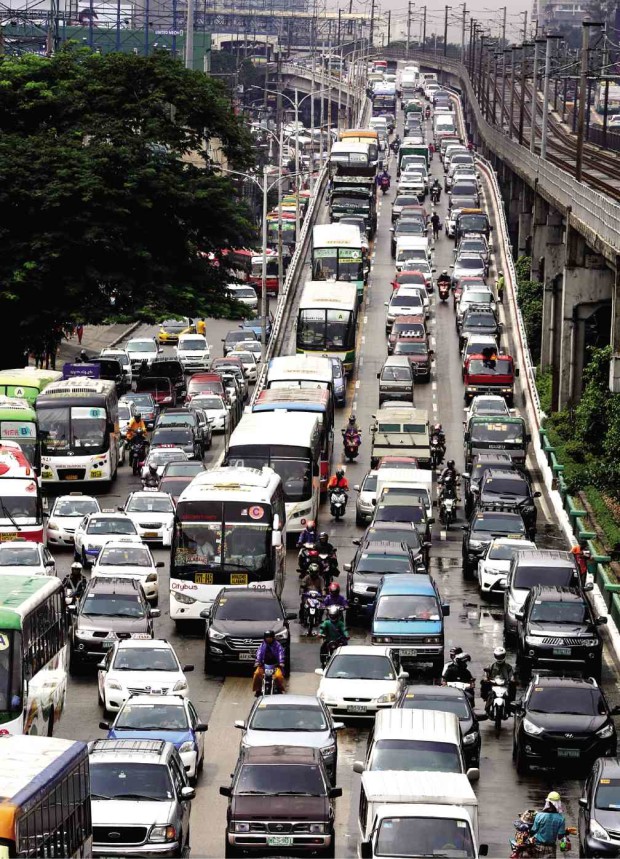In considering emergency powers to deal with Metro Manila’s traffic crisis, President-elect Rodrigo Duterte must not forget due process.
Chief Justice Maria Lourdes Sereno made the statement after Transportation Secretary-designate Arthur Tugade announced plans to seek special powers to deal with traffic jams in Metro Manila.
“Now, I would want a specific proposal before we can take this, on the ability of the government to satisfy the due process requirement of the Constitution,” Sereno told the Inquirer in an interview on Wednesday.
She said the Duterte administration, which would officially begin at noon on June 30, may also look at other factors that contributed to the daily traffic mess, estimated to cost the country P2.4 billion daily, according to a 2013 study by the Japan International Cooperation Agency.
“I am not sure that they have really decided that infrastructure is the key to solving the traffic mess. I’m sure it is an element, but whether it’s the only thing that has created the nightmare of Metro Manila traffic is something that the executive has to discuss,” Sereno said.
“They also have to talk about regulation on who is allowed to traverse those lanes, including the operation of PUVs (public utility vehicles). Is there enough enforcement of whatever regulatory regime is there? So … there are a multitude of dimensions that we need to address,” she said.
Already reviewing
Speaking on the sidelines of a business forum in Davao City, Tugade on Monday said the powers the administration would seek from Congress would allow the government to take over property, invoke right of way in private villages and stop courts from issuing temporary restraining orders (TROs) on critical infrastructure projects under litigation, a common cause of delays.
Sereno said the judiciary was already in the process of reviewing guidelines in the issuance of TROs, including those affecting public infrastructure projects.
She said such “rationalization” started even before.
“The subject matter of TROs for infrastructure projects is something that we must clarify strongly,” Sereno said.
“We have never failed to recognize the importance of infrastructure projects, and that’s why we keep on reiterating that the requirements under the rules of court before a restraint on the implementation of an infrastructure project can be judicially made, these must be scrupulously followed,” she said.
Just compensation
Sereno said one matter under close review was the issuance of TROs in cases involving expropriation of private property for public use.
Republic Act No. 8974, the law governing the right-of-way acquisition for public infrastructure purposes, requires the payment of commensurate compensation to affected private parties.
But while expropriation is allowed under the law, the state cannot just seize property without due process, Sereno said.
“You can say that we have started looking into it seriously with respect to valuation (of property) during expropriations. We have a lot of valuation cases right now, including for lands that are the subject of agrarian reform takings,” Sereno said.
Separation of powers
“The government cannot just confiscate property,” she said.
Sereno recalled Duterte’s statements on his legal training as a lawyer and former prosecutor.
“He has emphasized the fact that he has been trained in the law, and his people have affirmed this repeatedly, and in many ways, have said that they will respect the constitutional structure of power,” she said.
“I don’t see any reason why we will slow down at all in reforming the justice sector on account of that (Duterte’s statements), including ensuring the professional independence of the justice sector,” said Sereno, who will outlast Duterte’s presidency, being the nation’s Chief Justice until 2030.
And what of the longtime mayor’s tough, brash stance against those involved in crime and drugs? Sereno said she would wait for his official policy.
“Everything that he has said prior to June 30, I will take under advisement. But I will not take them as official policy. I will consider as official policy only pronouncements made after he has assumed his office,” she said.
